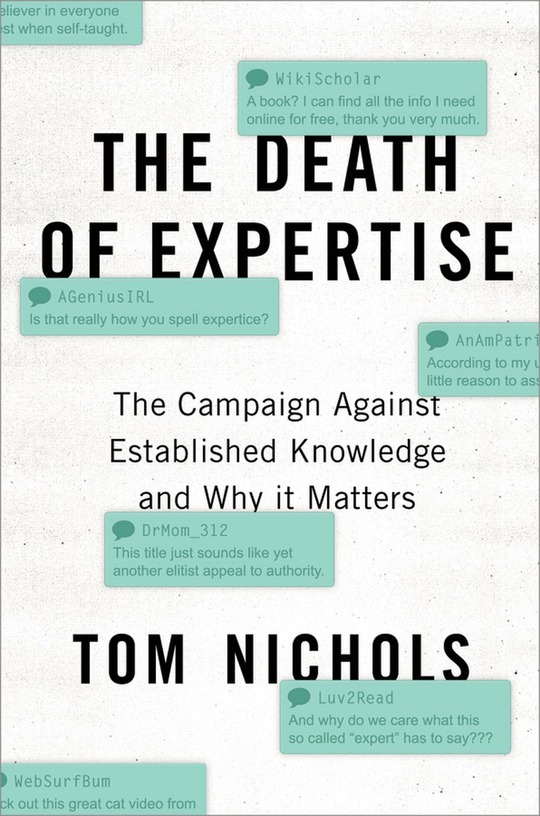Nibsy (e)k Thomas M. Nichols(r)en The Death of Expertise liburuaren kritika egin du
A Timely Warning; But Will It Be Heard?
4 izar
The last several years have seen a rise in contempt for expertise by a growing segment of society who seem to embrace, or even celebrate, ignorance. Examples from around the world are easy to find, but no more so than in the United States--especially since Donald Trump was elected, given his open hostility towards experts. The internet, especially social media, has provided anyone with an opinion--regardless of how misinformed it may be--with a platform that can potentially reach a global audience of millions. This has led to a growing sentiment that anyone's opinion on any matter is just as valid as anyone else's, regardless of the expertise of the person expressing it. Problem is, it's not.
But society has exacerbated this hostility towards expertise in a number of other ways beyond the internet. Shifts in reporting practices in the mainstream media that focus on engagement over veracity has led to …
The last several years have seen a rise in contempt for expertise by a growing segment of society who seem to embrace, or even celebrate, ignorance. Examples from around the world are easy to find, but no more so than in the United States--especially since Donald Trump was elected, given his open hostility towards experts. The internet, especially social media, has provided anyone with an opinion--regardless of how misinformed it may be--with a platform that can potentially reach a global audience of millions. This has led to a growing sentiment that anyone's opinion on any matter is just as valid as anyone else's, regardless of the expertise of the person expressing it. Problem is, it's not.
But society has exacerbated this hostility towards expertise in a number of other ways beyond the internet. Shifts in reporting practices in the mainstream media that focus on engagement over veracity has led to a decline in the quality of information they disseminate. It has also led to a massive increase in the number of partisan media outlets, which has contributed to the growing polarization of society. Cognitive biases, such as the Dunning-Kruger effect, has led some of the least knowledgeable people on any given topic to confidently express and amplify their (usually misinformed) opinions the loudest, while actual experts use caution and caveats in expressing theirs. The education system has also eroded the value of expertise, where post-secondary institutions place more effort and funding on providing students with "experiences" and "safe spaces" than equipping them with critical thinking skills and resilience to adversity, which are both necessary for thriving and surviving in a pluralistic society.
When bona fide experts are rejected by society and replaced by the misinformed opinions of propagandists, charlatans, and their advocates, democracy itself is threatened. But that's where we find ourselves today. The Death of Expertise by Tom Nichols addresses this problem, as an expert himself, by defining the problem and offering a number of possible ways to correct it. Some have criticized Nichols for drifting out of his lane (as a political scientist) by writing on this topic, but I disagree. As an academic, he's exactly the right sort of person to write a book like this--someone who understands not only the problem with the public's perception of experts and expertise, but also someone who appreciates the wider implications if this problem is allowed to fester. The book is written in clear, simple language without "dumbing-down" the content, so that maybe those who need this message most are more likely to read this book.

